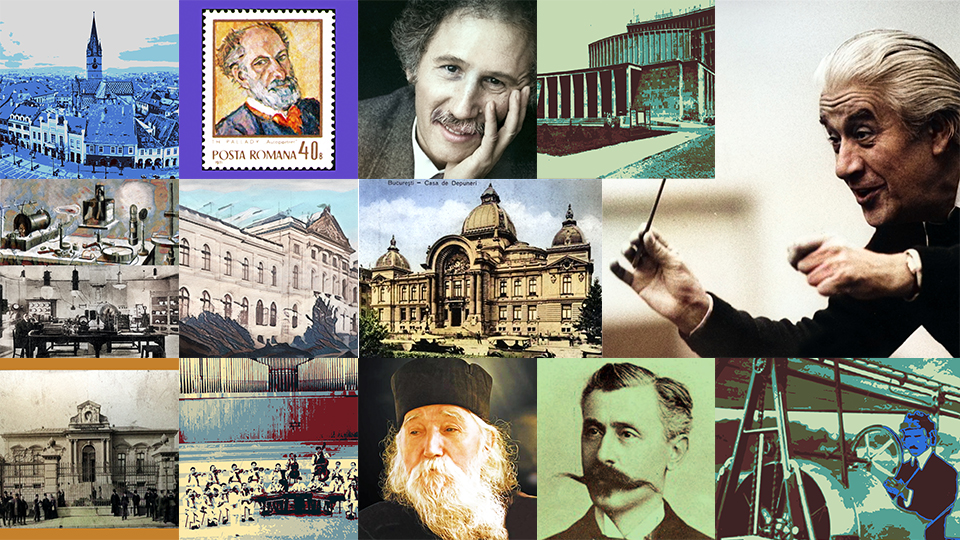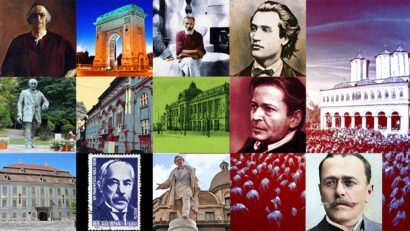Sergiu Celibidache (1912-1996)
The conductor Sergiu Celibidache was one of the major personalities of European and international classical music in the second half of the 20th century

Steliu Lambru, 09.11.2025, 13:27
The conductor Sergiu Celibidache was one of the major personalities of European and international classical music in the second half of the 20th century born in Romania. During his 84 years of life, Celibidache rose to fame thanks to a very personal conducting style. In his professional career of over half a century, in addition to an impressive artistic activity, he was also a conducting professor.
He was the principal conductor of the Berlin and Munich Philharmonic orchestras, and also led the London Symphony Orchestra and the Danish National Symphony Orchestra, the RAI, Radio France, Radio Stuttgart and Radio Sweden orchestras. He received numerous awards, decorations, honorary doctorates and honorary citizen titles.
The launch of the volume “Sergiu altfel” (A Different Sergiu), by his wife Ioana Celibidache, gave his son Serge Ioan Celebidachi an opportunity to share a few thoughts about his father:
Serge Ioan Celebidachi: “He never forgot what it means to have food on the table, and I think that’s where he understood the main values in life. He never forgot Romania, as we know and learn from the book. I missed him enormously. My mother, of course, missed my father too. Obviously, it was a huge break when he died, it was extremely hard for all of us. We have the same stories, my mother and I, a little different because she was more imaginative, more colorful, and so my notes don’t necessarily match hers. But this is about something else: it’s about him and about how much color he had about him, it’s about the fact that he was a genius, and he was also an uncompromising madman. In between all this, he is a three-dimensional man, in everything about his life, in his generosity, in his madness. It may seem like something small, perhaps unexpected, but I experienced it up close.”
In 1976, at age 33, the pianist Dan Grigore met Sergiu Celibidache for the first time:
Dan Grigore: “I was visiting the violinist Ion Voicu, who didn’t know how to charm Maestro Celibidache, to attract him. He had an ulterior motive, which was as subjective and understandable as possible, in a way. He wanted to get Maestro Celibidache to teach his son, Michi, to conduct. And I kept telling him ‘Maestro, it won’t work! He can’t learn from Maestro Celibidache because one doesn’t learn from Celibidache. One steals from Celibidache. Celibidache has some forks that he puts in front of students and only if they pass, if he sees that they are worth it, will he know that they are able to receive something from him. Otherwise, it’s not working!> And he didn’t believe me. I asked Maestro Celibidache to accept me on his course and I told him that I didn’t want to conduct. ‘I just want to learn music with you,’ I told him, ‘to know if I can confirm what I believe, the path I am on, is already an extraordinary thing. But I think I still have a lot to learn from you.’ And he answered, ‘Yes, of course, tell Voicu to put you on the list.”
One of Celibidache’s great disappointments was that he could not visit his country for a long time after 1945.
Dan Grigore: “He was extraordinarily up-to-date on what was happening in Romania, because he was very connected to Romania. He might not have acknowledged it to everyone, but he was extraordinarily connected to Romania and would ask all the Romanians who came to him about the state of affairs in Romania. He knew a lot of things, maybe he didn’t show it, but he knew a lot and he was perfectly informed. My reply to those who still remember the reprimand he gave us at the Philharmonic, ‘How did you put up with so much mediocrity?’, is that I also used to tell him ‘It’s the system, maestro!’ ‘Dane, Dane, don’t take it so lightly,’ he would answer. He later told me that he knew very well what I had endured. ‘Your Mozart’ (I played a Mozart concert with him there) is somehow imbued with some suffering that you experienced. I see him a little more solar, but it’s just as valid as yours.’ He was careful to put the bandage, so as not to hurt me. He was amazingly delicate.”
For Serge Ioan Celebidachi, the country house in France has an even greater value now that his parents are no longer there.
Serge Ioan Celebidachi: “It’s a reference place for my family, and when I miss my father or my mother, that’s where I find them. I know every story in the garden, every tree has a different story and he explained to me how he planted one of them when a dog was born, for example. In some way, he made the whole garden to find a part of Romania, over time. And I didn’t really understand this idea until my cousin Radu came to his funeral. Radu Macovei explained to me how Romanian this house was. It had Romanian blouses on the walls and wood worked in a certain way. For me, it was the family home, a place for the weekend, and it was obvious that we found ourselves there. But there was something much deeper. And when I look at it I see what he would see, things he didn’t say out loud. He was very modest somehow and didn’t say how much he missed Romania and his family. This was something you have to see and feel there, where you can really see everything. And you understand much better how he lived when he left Romania and couldn’t return. There was nothing he could do, nobody let him return and participate in the music scene in Romania.”
“Sergiu altfel” is the biography of Sergiu Celibidache, an artist who lived in exile. But it is also about the search for meaning in a world often perceived as one of meaninglessness. (AMP)




























